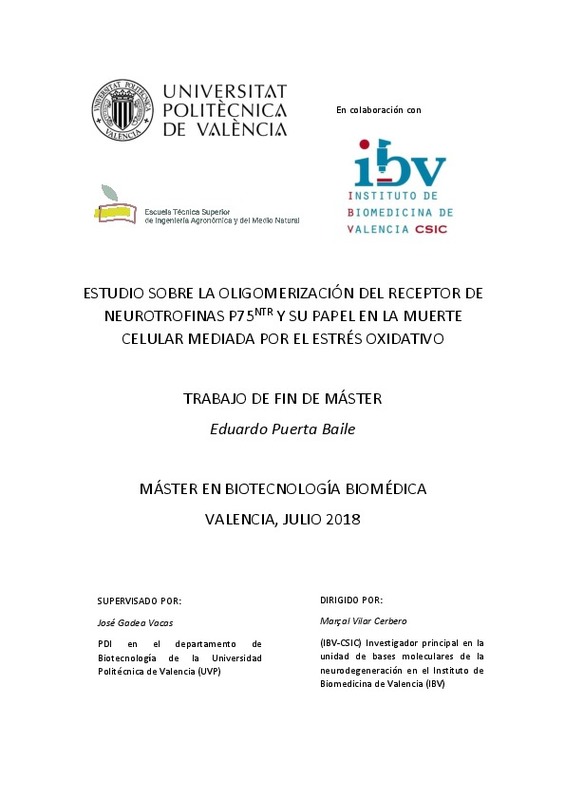JavaScript is disabled for your browser. Some features of this site may not work without it.
Buscar en RiuNet
Listar
Mi cuenta
Estadísticas
Ayuda RiuNet
Admin. UPV
Estudio sobre la oligomerización del receptor de neurotrofinas p75 y su papel en la muerte celular mediada por el estrés oxidativo
Mostrar el registro sencillo del ítem
Ficheros en el ítem
| dc.contributor.advisor | Gadea Vacas, José
|
es_ES |
| dc.contributor.advisor | Vilar Cerveró, Marçal
|
es_ES |
| dc.contributor.author | Puerta Baile, Eduardo
|
es_ES |
| dc.date.accessioned | 2018-10-17T06:59:16Z | |
| dc.date.available | 2018-10-17T06:59:16Z | |
| dc.date.created | 2018-07-20 | |
| dc.date.issued | 2018-10-17 | es_ES |
| dc.identifier.uri | http://hdl.handle.net/10251/110677 | |
| dc.description.abstract | Las neurotrofinas son una familia de proteínas que participan en la supervivencia, desarrollo y plasticidad neuronal. Las neurotrofinas ejercen su función en unirse a dos tipos de receptores; los receptores de la familia Trk y p75. p75 es un receptor transmembrana de neurotrofinas implicado en una gran variedad de procesos durante el desarrollo del sistema nervioso que pueden implicar tanto muerte o supervivencia, como inhibir el crecimiento de los conos neurales. Se ha demostrado previamente que p75 modula la muerte neuronal causada por estrés oxidativo. Así, en células PC12, p75 tiene un papel antioxidante en presencia de su ligando NGF a concentraciones crecientes de agua oxigenada, aumentando su supervivencia en un modelo de estrés oxidativo. En este estudio hemos encontrado que concentraciones crecientes de agua oxigenada promueven la formación de nuevos oligomeros de p75 mediante la formación de puentes disulfuro. Se ha determinado los residuos de cisteína libres responsables de la formación de estos oligomeros y como mutaciones de estas cisteínas afectan a la activadad antioxidante de p75. | es_ES |
| dc.description.abstract | Neurotrophins are a family of proteins that participate in neuronal survival, development and plasticity. Neurotrophins exert their function by binding to two types of receptors; the receptors of the Trk family and p75. p75 is a transmembrane neurotrophin receptor involved in a great variety of processes during the development of the nervous system that may involve both death or survival, and inhibit the growth of neural cones. It has previously been shown that p75 modulates neuronal death caused by oxidative stress. Thus, in PC12 cells, p75 has an antioxidant role in the presence of its NGF ligand at increasing concentrations of hydrogen peroxide, increasing its survival in a model of oxidative stress. In this study we have found that increasing concentrations of hydrogen peroxide promote the formation of new p75 oligomers by the formation of disulfide bounds. The free cysteine residues responsible for the formation of these oligomers have been determined and as mutations of these cysteines affect the antioxidant activity of p75. | en_EN |
| dc.language | Español | es_ES |
| dc.publisher | Universitat Politècnica de València | es_ES |
| dc.rights | Reserva de todos los derechos | es_ES |
| dc.subject | Estrés oxidativo | es_ES |
| dc.subject | P75 | es_ES |
| dc.subject | Receptor transmembrane | es_ES |
| dc.subject | Agua oxigenada | es_ES |
| dc.subject | Neurona | es_ES |
| dc.subject | Neurotrofina | es_ES |
| dc.subject | Oxidative stress | en_EN |
| dc.subject | Pt5 | en_EN |
| dc.subject | transmembrane | en_EN |
| dc.subject | hydrogen peroxide | en_EN |
| dc.subject | neuron | en_EN |
| dc.subject | neurotrophin | en_EN |
| dc.subject.classification | BIOQUIMICA Y BIOLOGIA MOLECULAR | es_ES |
| dc.subject.other | Máster Universitario en Biotecnología Biomédica-Màster Universitari en Biotecnologia Biomèdica | es_ES |
| dc.title | Estudio sobre la oligomerización del receptor de neurotrofinas p75 y su papel en la muerte celular mediada por el estrés oxidativo | es_ES |
| dc.type | Tesis de máster | es_ES |
| dc.rights.accessRights | Abierto | es_ES |
| dc.contributor.affiliation | Universitat Politècnica de València. Departamento de Biotecnología - Departament de Biotecnologia | es_ES |
| dc.description.bibliographicCitation | Puerta Baile, E. (2018). Estudio sobre la oligomerización del receptor de neurotrofinas p75 y su papel en la muerte celular mediada por el estrés oxidativo. http://hdl.handle.net/10251/110677 | es_ES |
| dc.description.accrualMethod | TFGM | es_ES |
| dc.relation.pasarela | TFGM\88285 | es_ES |






